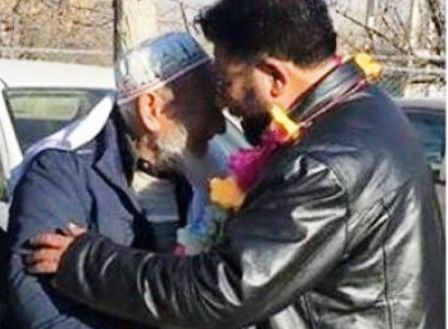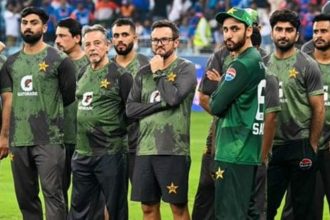Abdul Gafoor, a victim of the 1971 war met his son at Skardu airport on December 28, 2015 after 44 long years.
A local journalist Musa Chulunkha who witnessed the rare reunion said the scene made many teary-eyed at the airport where Sani had landed from Islamabad after a long journey from India last Monday.
Gafoor while talking to the media said “How lucky am I to see my son again after such a long time. I can’t believe my eyes. God had perhaps kept me alive for this very day,”
Ibrahim Sani, son of Abdul Gafoor was hardly six years old when India and Pakistan went to war over what was then East Pakistan. As the war rapidly escalated, the Indian army crossed the Line of Control (LoC) that divides the Himalayan region into Pakistani and Indian territories, and occupied Chulunkha, Tyakshi, Thang and Turtuk of Chorbat village in Ghanche district on the Pakistani side. The morning came and people who used to live in Pakistan were suddenly a part of an area controlled by another nation.
Gafoor and his family used to live in Tyakshi, Chorbat close to Ladakh. But it was his sheer bad luck when Indian forces took over Chorbat, Gafoor, then 38, was in Skardu. He had left his wife, a daughter and son behind in search of a job. His wife and children, however, woke up to find Tyakshi was Indian-controlled territory.
“Just like that, I was told my land and my family were no longer mine,” said Gafoor. “I had lost everything but hope to that war; hope for a reunion one day. Perhaps God kept me alive for this very moment.”
As time passed by, Gafoor married another woman and they had a daughter and a son. While one family took root across the border, Sani the child grew up listening to stories about Gafoor, conjuring and resurrecting a father he did not know.
Sani told The Express Tribune in an exclusive interview over the telephone from Skardu town “I don’t remember when all of this happened,” said Sani, who is now 52. “My mother kept me telling stories of war and my father till her death some years back,”
“This [reunion] is my second birth. I’m so thankful to God for making this happen. Our father had been the centre of our family’s conversations in all those long years.” Sani said, “We would just think of him and try and imagine what he liked to eat and how ecstatic he would be to see us again.”
It was after nine long years of separation, Sani said, when the first letter arrived from relatives across the LoC, re-establishing ties which the arbitrary nature of war almost severed.
Gafoor’s relatives who could read and write used to translate the letter into Balti so the father could read about his family living across the border.
The correspondence continued till telephone service was established in the region in the early 2000s. At present cellular service is the source of communication between the two ends but holding a plastic device connecting crackling voices is hardly a substitute for meeting your own flesh and blood in person.
The journey between the two ends which once took only a few hours on foot stretched to weeks of arduous travel requiring proof of a life in paperwork. Sani had to first visit the Pakistani embassy in Delhi, a five-day trip. “The embassy gave me a one month visa for Pakistan,” said the man who sounded fatigued just talking about it.
“Next I had to travel to Wagah Border where I had to fulfil other formalities.” Once in Pakistan, Islamabad was the next destination where he had to spend two weeks to complete visa formalities which included an application for the extension of his visa for another three months.
“Let me tell you again – I was lucky enough to get a PIA ticket immediately which took me to Skardu.”
Sani is now with his father and other relatives in Skardu. He is hopeful his visa will be extended for another three months. But Sani lacks peace of mind he says; that he does not know when he can set foot on what was once his own homeland haunts him.
“Will I ever be able to see my father again? What will happen to my father once I go back [to Tyakshi]?” said Sani. “Isn’t it possible for both governments to just open the traditional route between the two ends of our worlds to let the relatives meet each other once in a while?” Sani stops to think but fails to answer his own question.






